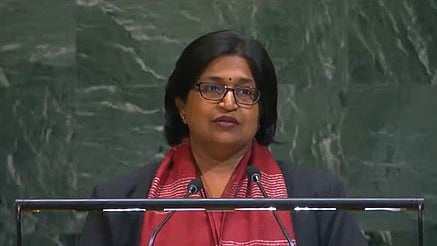World
India slams stalled UN Security Council reform as ‘theatre of the absurd’
India said genuine reform must correct “historic injustices”, especially Africa’s under-representation, by adding new permanent seats

India has sharply criticised the prolonged and unproductive efforts to reform the United Nations Security Council (UNSC), describing the process as a “theatre of the absurd” and urging member states to adopt a negotiating text to break the deadlock.
Speaking at the UN General Assembly on Tuesday, India’s Deputy Permanent Representative, Yojna Patel, said the 17-year-old Intergovernmental Negotiations (IGN) process had trapped countries in an “endless cycle” of repetitive statements with no tangible progress.
“In the 17 years since the IGN format was initiated, it has been reduced to a theatre of the absurd,” Patel said, adding that member states remained “locked in discussions that lead nowhere”. She stressed that credibility could only be restored by moving to text-based negotiations backed by clear milestones and timelines.
Patel called for “introspection and soul-searching” on why the reform process had remained stalled for nearly two decades. Drawing a parallel with Greek mythology, she questioned whether the UN was condemned to “a Sisyphean cycle for eternity” unless genuine political will emerged.
Her remarks come as the IGN enters a new phase under recently appointed co-chairs Tareq M. A. M. AlBanai of Kuwait and Lise Gregoire-van Haaren of the Netherlands, tasked with steering negotiations during the current session. India expressed hope that the duo would help shift discussions towards concrete outcomes.
A key hurdle, Patel noted, is a small bloc known as the United for Consensus (UfC), led by Italy and including Pakistan, which has consistently opposed the expansion of permanent membership. She accused the group of using procedural tactics to prevent the adoption of a negotiating text, effectively turning “consensus into a veto by another name”.
Published: undefined
India reiterated that any meaningful reform must address “historic injustices”, particularly the under-representation of African nations, and expand permanent seats rather than merely increasing non-permanent ones.
Patel also rejected proposals to create reserved seats for the Organisation of Islamic Cooperation (OIC), warning that “faith cannot become the determining criterion for Council entitlement”. While supporting greater inclusion of small island developing states, she argued that cross-regional religious groupings could not lay comparable claims.
India, along with Brazil, Germany and Japan, forms the G4 grouping advocating for an expanded Security Council with new permanent members. Speaking on behalf of the G4, Brazil’s Permanent Representative Sergio Franca Danese said global confidence in the UN’s effectiveness was eroding.
“The UN is widely seen as ineffective and facing major challenges,” he said. “Reform is not an option, but an imperative. We must stop talking about talking and start negotiating.”
With geopolitical tensions rising and the credibility of multilateralism under scrutiny, India and its G4 partners have renewed their push for structural reform, warning that further delay risks undermining the relevance of the UN system itself.
With IANS Inputs
Published: undefined
Follow us on: Facebook, Twitter, Google News, Instagram
Join our official telegram channel (@nationalherald) and stay updated with the latest headlines
Published: undefined